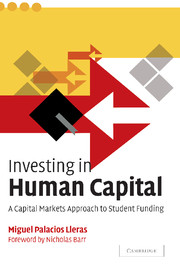Book contents
- Frontmatter
- Contents
- List of figures
- List of tables
- Foreword
- Acknowledgments
- Introduction
- Part I The problem of financing education
- Part II Equity-like investments to finance education
- 4 The evolution of human capital contracts
- 5 How human capital contracts work
- 6 The case for human capital contracts
- 7 Human capital options
- Part III Implementing human capital contracts
- Appendix A Valuation of human capital contracts
- Appendix B Using human capital options to value income-contingent loans
- Appendix C Features of human capital contracts, income-contingent loans, and traditional mortgage-type loans
- Appendix D A developing country study
- Notes
- References
- Index
4 - The evolution of human capital contracts
Published online by Cambridge University Press: 08 January 2010
- Frontmatter
- Contents
- List of figures
- List of tables
- Foreword
- Acknowledgments
- Introduction
- Part I The problem of financing education
- Part II Equity-like investments to finance education
- 4 The evolution of human capital contracts
- 5 How human capital contracts work
- 6 The case for human capital contracts
- 7 Human capital options
- Part III Implementing human capital contracts
- Appendix A Valuation of human capital contracts
- Appendix B Using human capital options to value income-contingent loans
- Appendix C Features of human capital contracts, income-contingent loans, and traditional mortgage-type loans
- Appendix D A developing country study
- Notes
- References
- Index
Summary
In chapters 1–3, I briefly explained why education is considered to be a good investment and why it is a key factor for economic development in almost every country in the world. I also briefly surveyed the traditional solutions that have been used for financing education and explained why those solutions are not the best ones. I will now discuss an alternative that addresses the main problems in financing education: human capital contracts (HCCs).
HCCs are contracts in which students commit part of their future income for a predetermined period of time in exchange for capital for financing education. I will use the following chapters to explain how this would operate and why HCCs should be considered a solution for financing education. This chapter will be devoted to tracing the origin and development of the idea.
Origins of the idea
The idea of committing part of one's future income in exchange for capital for financing education is not new. Milton Friedman mentioned the possibility of individuals selling a share of their future income in order to finance their education. Friedman first introduced the idea as a footnote in Income from Independent Professional Practice (Friedman and Kuznets, 1945), where he described the proposal as “an analogy that at first blush may seem fantastic.” (Friedman and Kuznets, 1945, 90). In 1955, Friedman made a more detailed analysis in his paper “The Role of Government in Education” (Friedman, 1955).
- Type
- Chapter
- Information
- Investing in Human CapitalA Capital Markets Approach to Student Funding, pp. 41 - 52Publisher: Cambridge University PressPrint publication year: 2004



